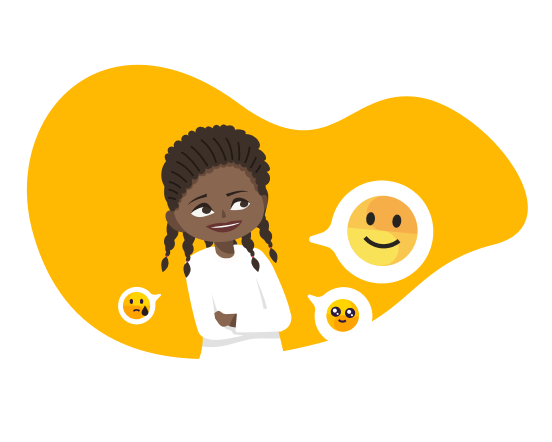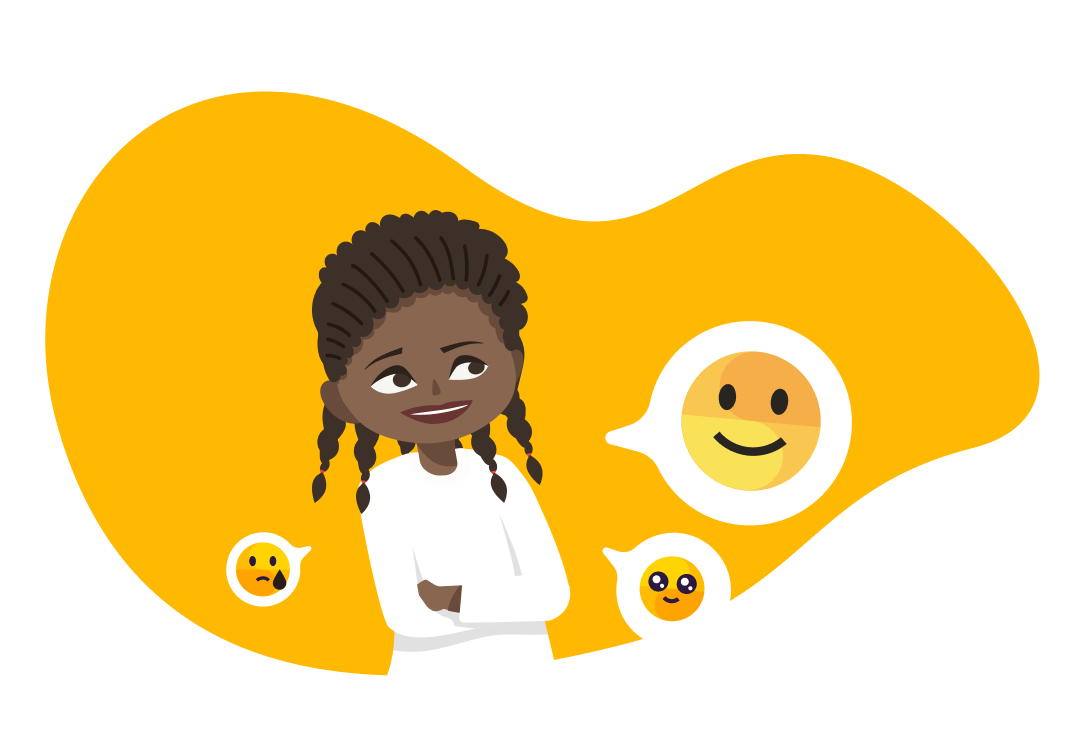
Emotional intelligence development in children
Each of us knows what IQ is, but the term emotional quotient (EQ) is an unfamiliar concept for many. However, a person with high intellectual development may be too withdrawn emotionally. This becomes an obstacle for him on the way to achieving his goals.
Daniel Goleman is a science journalist, psychologist, and writer based in the United States. He developed and popularized a blended emotional intelligence model based on five key components: empathy, motivation, self-knowledge, self-control, and social skills.
Let’s put it simply. IQ helps a child succeed. EQ enables you to connect with people and feel happier.
The scientist claims that people acquire the ability to think and make decisions on an emotional level thanks to the developed emotional intelligence. After all, emotions are directly interconnected not only with thoughts but also with human actions. This relationship allows us to move towards our goals, build social connections and achieve success. Therefore, it is important to develop emotional intelligence in children and from a very early age.
What is emotional intelligence?
Emotional intelligence refers to a person’s ability to understand and perceive their own and other people’s emotions, empathize under challenging situations, interact with other people, and control emotional impulses.
However, almost 75 — 80% of parents’ attention is paid to the development of only the intellectual abilities of children. This happens as a result of social pressure: it is generally accepted that feelings and emotions do not need special training. But such a stereotype subsequently leads to psychosomatic disorders, which can manifest themselves in a child at any age.
Therefore, it is essential to correctly distribute efforts between the development of emotional and academic intelligence. The optimal ratio is 50:50. Do not put off emotional education “for later”. This should be started as early as possible. So it will be much easier for the child to adapt in society, communicate with peers and older children, make friends and maintain trusting relationships with parents.
How to recognize a child with high EQ: the main signs
- A child in a frustrated state knows why this happened. A boy or a girl is able to independently determine the cause of his current dissatisfaction and can adequately explain it to adults (parents or teachers). A kid must remember that there are no whims without a reason.
- The child understands emotionally when the parents are angry. Emotionally intelligent children stop crying and indulging about 5 to 10 minutes before their parents run out of patience. This happens because children are very sensitive to both their own and others’ emotions. Therefore, they can stop in time so as not to provoke a conflict.
- The child knows how to delicately say no. Children with underdeveloped EQ do not know how to admit their mistakes — they try to shift the blame onto other people. Children with developed emotional intelligence perceive their mistakes, rethink them, and carry this experience into adulthood.
- The child does not experience a sense of perfectionism. Experiences about the constant striving for an unattainable ideal greatly prevent people from perceiving reality in bright colors and being proud of the results achieved. Children who do not suffer from perfectionism strive primarily for harmony within themselves but not for the perfection of the world around them.
- The child feels comfortable in the company of peers and can resolve conflicts with them. With a low level of EQ in a child, the parents take on the solution of all conflict situations. But children with a high level of emotional intelligence are able to negotiate with their peers themselves and get out of conflict situations.
What role does emotional intelligence play in a child’s life?
Emotions play a huge role in the life of every person. In some situations, they help, and in some, they interfere in solving certain issues. For children in adulthood to be able to cope with their feelings, it is necessary to develop emotional intelligence from an early age. In this case, experiencing a certain emotion, the child will be able to realize what he is experiencing. What is most important, a kid will be able to explain his feelings in words.

Parents need to provide their child with all-around support regarding his right to experience certain emotions. However, adults often substitute for “emotion and action”. But if a child is in a state of aggression, this does not mean that he will immediately enter into a conflict. Therefore, the child’s ability to separate emotions and real actions will help him eliminate the fear of experiencing negative feelings and teach him to control his emotions.
Children learn every minute and get to know the world around them. An example for them can be not only parents but also teachers and peers. The success of EQ development is based on three factors:
- The individual needs of the child. Each child is unique, so learning success may vary.
- Support from parents. Even if the child does not succeed in something, parents should not criticize.
- Educational programs and direct participation of teachers.
When a child gains new knowledge, he receives visible results, with which he confidently enters into adulthood:
- knowledge, experience, and practical skills;
- an emotional trace and an assessment of one’s own behavior (this can be a feeling of disappointment or satisfaction);
- training in the ability to further self-study;
- the memory of teachers and their behavior (for example, a kind teacher forms in a child a feeling of kindness, decent, etc.);
- the experience that the child has gained with other children in the learning process (this teaches the child to perceive other people’s emotions and behavior to delve into the essence of their problems).
If parents regularly work to develop emotional intelligence, children are going to perform better in learning. They find new friends much easier, conflict less, and experience more positive emotions.
Children with a high EQ level recover faster from negative emotions they have experienced — they calm down more quickly. Thus, developing emotional intelligence gives the child the benefits such as:
- preservation of psychological health;
- reducing the risk of conflict;
- easier contact with people around;
- the ability to control emotions;
- improving relations in society;
- improving the quality of life in all areas.
It is essential to teach him how to interact with other people in childhood in order for a child to feel like a happy and successful citizen of society in adulthood. If parents develop emotional intelligence in their child, it will be much easier for him to establish and maintain relationships with others, provide support and assistance, and avoid or resolve conflicts. Using the emotional resources received in childhood, the child will be able to easily achieve their goals, rise high on the career ladder, and feel truly happy.
Why can children have emotional intelligence problems, and how to notice them?
Biological (hereditary) factors can be a prerequisite for low emotional intelligence:
- the level of development of EQ in parents (the higher it is in the parents, the more likely it is that the child will also have it high);
- right hemisphere type of thinking (it is the right hemisphere that is responsible for the emotional color of the perceived information);
- qualities of temperament (for example, a sanguine child more easily adapts to circumstances due to a balanced type of nervous system and a desire for communication).
In addition to biological factors, social factors also affect the level of EQ: emotional reaction of people to the child’s behavior, education of parents, family financial well-being, and so on.

It is impossible to accurately calculate the EQ; not a single methodology and testing have yet been developed to determine it. At the same time, an objective assessment can be obtained based on the signs indicating a low level of emotional intelligence:
- The child easily succumbs to stress. When the child cannot recognize the origin of aggressive emotions, he or she receives a huge level of stress, which he also cannot cope with.
- An insufficient level of assertiveness that is the child’s ability not to depend on others’ opinions, control his behavior, and be responsible for his actions. A child with well-developped emotional intelligence will always keep people at a distance when he or she feels that they want to use him to their advantage. With a low EQ level, the child cannot adhere to his point of view, which causes bouts of aggression in him.
- Insufficiently extensive emotional vocabulary. Each person experiences emotions, but only a child with a high EQ is able to clearly define a particular emotion. With a low level of emotional intelligence, a person is mistaken in terminology. The more specific the characteristic of the emotional state, the easier it is to cope with it.
- The child constantly thinks that he was misunderstood. When communicating with other people, a person with a low EQ cannot correctly formulate his thoughts. It is difficult for such people to convey the essence of what was said to the interlocutor.
- The child does not know his own key triggers — each person has his own triggers, which at some point make him succumb to impulsive behavior.
Tips for parents to improve their children’s emotional intelligence
1. Admit your child’s experience as important
If a child experiences an event too emotionally, this means that what happened really matters to him. In such situations, there is no need to console the child with the words “nothing terrible happened” or “this is not a big trouble.” Children perceive these phrases as a denial of the importance of their experiences and devaluation of feelings.
2. Don’t forbid to cry
The psyche of young children “works” in the same way as adults — in the first minutes, they need to throw out their condition, and they do it with the help of tears. Sometimes you don’t need to try to calm your child down. Just hug a kid and let him cry. This will give the opportunity to experience the emotion. This is a colossal experience that in the future will help the child cope with negative emotions faster.
3. Learn to listen and hear your child
This recommendation is especially relevant when talking with teenagers. There is no need to rush to offer your child thousands of “useful advice”. It is important to initially give him his say. During the conversation, parents may ask clarifying questions to understand in detail the essence of the problem. Through frank conversations, the child will understand that you can be trusted.
4. Don’t give your child empty hopes
The phrase “everything will be alright” is perceived by children as a promise that you cannot fulfill later. You also can’t know that everything will really be okay. Instead, show your child that you are committed to doing your best to improve the situation.
5. Evaluate and select the degree of intervention in the situation
It is very important that parents remain calm in all situations. If your child is offended by a neighbor’s peer boy, you do not need to intervene in their conflict. Allow your children to solve the problem on their own. Remember, children must learn to defend their rights and defend their opinions. If the child cannot cope on his own, contacting a psychologist is an excellent solution.
6. Ask your child if you can help
If you doubt what kind of help your child needs, do not be shy — ask him, “Can I help you with something?” Of course, these questions are worth asking older children. Remember that adolescents are extremely sensitive to help from their parents. Therefore, in order not to cause a wave of irritation in the child, think carefully about the wording of the questions.
7. Find ways out of this situation together
Children often try to hide from their parents their problems that relate to relationships with other people. These may be conflicts with classmates who tease him for indecision or shyness. In such a situation, you need to help the child find effective ways to solve the problem, but only taking into account his age.
To sum up
After the child learns to be aware of and analyze the emotions that he is experiencing at a certain point in time, he will be able to control them and, most importantly, to control emotional outbursts. Unhurried walks in the fresh air, listening to calm music, watching your favorite cartoons help increase the effectiveness of teaching emotional behavior.
It is important to teach the child to show his feelings and emotions so that he does not accumulate them inside himself. You need to explain to him the importance of each emotion, both positive and negative. This will allow the child not to withdraw into himself, but, on the contrary, to find ways out of the current situations.

new engaging articles



